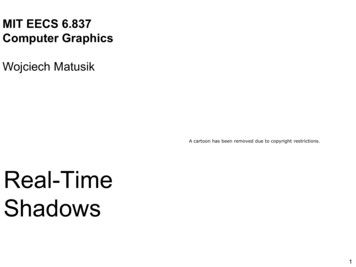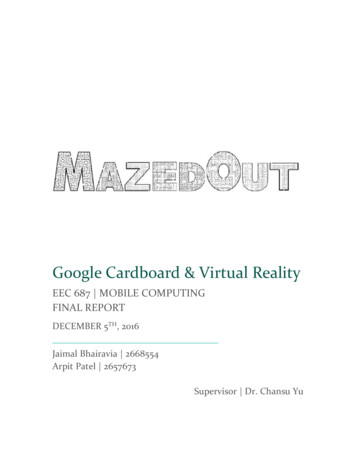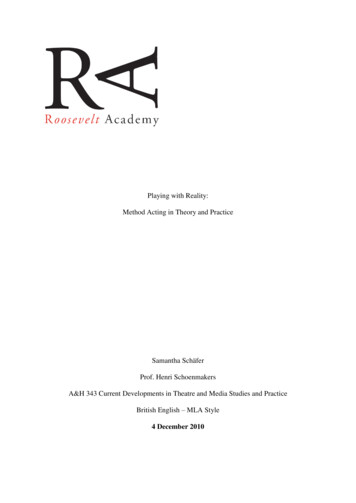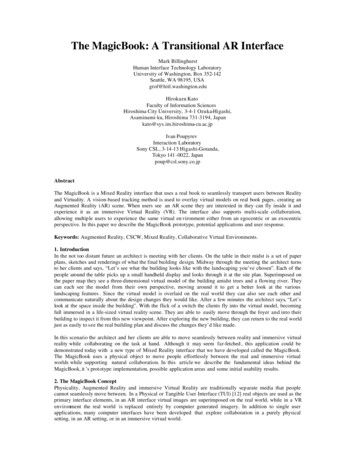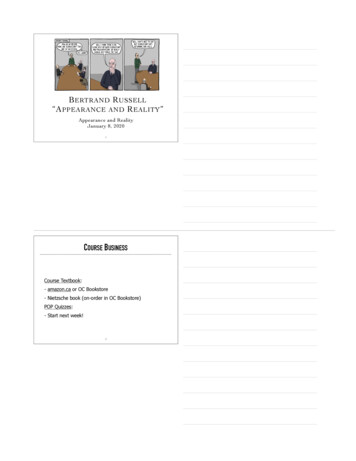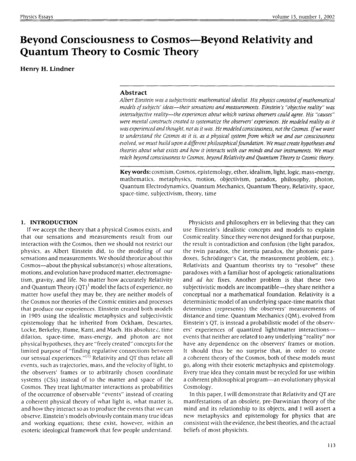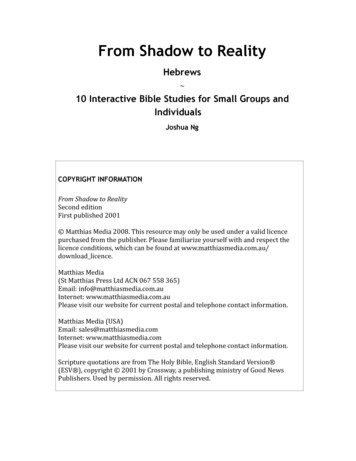
Transcription
From Shadow to RealityHebrews 10 Interactive Bible Studies for Small Groups andIndividualsJoshua NgCOPYRIGHT INFORMATIONFrom Shadow to RealitySecond editionFirst published 2001 Matthias Media 2008. This resource may only be used under a valid licencepurchased from the publisher. Please familiarize yourself with and respect thelicence conditions, which can be found at www.matthiasmedia.com.au/download licence.Matthias Media(St Matthias Press Ltd ACN 067 558 365)Email: info@matthiasmedia.com.auInternet: www.matthiasmedia.com.auPlease visit our website for current postal and telephone contact information.Matthias Media (USA)Email: sales@matthiasmedia.comInternet: www.matthiasmedia.comPlease visit our website for current postal and telephone contact information.Scripture quotations are from The Holy Bible, English Standard Version (ESV ), copyright 2001 by Crossway, a publishing ministry of Good NewsPublishers. Used by permission. All rights reserved.
CONTENTSHow to make the most of these studiesSTUDY 1: Overview: From shadow to realitySTUDY 2: Don’t ignore God’s inal word [Hebrews 1:1-2:4]STUDY 3: The Man who rules the future [Hebrews 2:5-3:6]STUDY 4: Don’t miss out [Hebrews 3:7-4:13]STUDY 5: Can a Christian fall away? [Hebrews 4:14-6:20]STUDY 6: ‘Mel’ who? [Hebrews 7:1-28]STUDY 7: The Obsoletor [Hebrews 8:1-9:28]STUDY 8: The priest who sat down [Hebrews 10:1-25]STUDY 9: No faith, no inish [Hebrews 10:26-12:11]STUDY 10: True worship [Hebrews 12:12-13:25]APPENDIX: Hebrews overviewff Matthias Media. For use only with a valid licence purchased from the publisher.2
HOW TO MAKE THE MOST OFTHESE STUDIES1. What is an Interactive Bible Study?Interactive Bible Studies are a bit like a guided tour of a famous city. They takeyou through a particular part of the Bible, helping you to know where to start,pointing out things along the way, suggesting avenues for further exploration, andmaking sure that you know how to get home. Like any good tour, the real purpose isto allow you to go exploring for yourself—to dive in, have a good look around, anddiscover for yourself the riches that God’s word has in store.In other words, these studies aim to provide stimulation and input and point youin the right direction, while leaving you to do plenty of the exploration and discoveryyourself.We hope that these studies will stimulate lots of ‘interaction’— interaction withthe Bible, with the things we’ve written, with your own current thoughts andattitudes, with other people as you discuss them, and with God as you talk to himabout it all.2. The formatThe studies contain ive main components: sections of text that introduce, inform, summarize and challenge numbered questions that help you examine the passage and think through itsmeaning sidebars that provide extra bits of background or optional extra study ideas,especially regarding other relevant parts of the Bible (usually there will besome coloured text like this to indicate that there is a related sidebar). ‘Implications’ sections that help you think about what this passage means foryou and your life today suggestions for thanksgiving and prayer as you close.3. How to use these studies on your own Before you begin, pray that God would open your eyes to what he is saying inthe Bible, and give you the spiritual strength to do something about it.Work through the study, reading the text, answering the questions about theBible passage, and exploring the sidebars as you have time.Resist the temptation to skip over the ‘Implications’ and ‘Give thanks andpray’ sections at the end. It is important that we not only hear andunderstand God’s word, but respond to it. These closing sections help us dothat.Take what opportunities you can to talk to others about what you’ve learnt.f Matthias Media. For use only with a valid licence purchased from the publisher.3
4. How to use these studies in a small group Much of the above applies to group study as well. The studies are suitable forstructured Bible study or cell groups, as well as for more informal pairs andtriplets. Get together with a friend or friends and work through them at yourown pace; use them as the basis for regular Bible study with your spouse. Youdon’t need the formal structure of a ‘group’ to gain maximum bene it.For small groups, it is very useful if group members can work through thestudy themselves before the group meets. The group discussion can takeplace comfortably in an hour (depending on how sidetracked you get!) if allthe members have done some work in advance.The role of the group leader is to direct the course of the discussion and totry to draw the threads together at the end. This will mean a little extrapreparation—underlining the sections of text to emphasize and read outloud, working out which questions are worth concentrating on, and beingsure of the main thrust of the study. Leaders will also probably want to workout approximately how long they’d like to spend on each part.If your group members usually don’t work through the study in advance, it’sextra important that the leader prepares which parts to concentrate on, andwhich parts to glide past more quickly. In particular, the leader will need toselect which of the ‘Implications’ to focus on.We haven’t included an ‘answer guide’ to the questions in the studies. This isa deliberate move. We want to give you a guided tour of the Bible, not alecture. There is more than enough in the text we have written and thequestions we have asked to point you in what we think is the right direction.The rest is up to you.5. Bible translationPrevious editions of this Interactive Bible Study have assumed that most readerswould be using the New International Version of the Bible. However, since therelease of the English Standard Version in 2001, many have switched to the ESV forstudy purposes. So with this new edition of From Shadow to Reality, we have decidedto quote from and refer to the ESV text, which we recommend.f Matthias Media. For use only with a valid licence purchased from the publisher.4
STUDY 1Overview: From shadow to realityThe second-century heretic, Marcion, was infamous for deleting the OldTestament from his Bible. To him, the just and vengeful God of the Old Testamentbore no relationship at all to the merciful and loving God of the New. The OldTestament had nothing worthwhile to say to Christians, and so Marcion simply gotrid of it. He also deleted parts of the New Testament that either quoted or echoedthe Old. We can imagine that he would have loved the Bible on computer—itwould’ve made cutting and pasting so much easier!We might regard Marcion’s attitude as crude and mistaken, but many modernChristians are Marcionites in practice. They aren’t really sure what to do with theOld Testament, and so they basically ignore it. A ‘New Testament with Psalms’ is theonly Bible they need to carry with them.1. Have a quick glance through the book of Hebrews. How much of Hebrews doyou think would be left after Marcion’s scissors had inished their snipping?2. What can we conclude about the relevance of the Old Testament for Christians,as far as the writer of Hebrews is concerned?3. How does this compare with your attitude to the Old Testament? Are you aMarcionite in practice? What are your main dif iculties in reading the OldTestament?The whole argument of Hebrews is founded on the truth and relevance of the OldTestament for us today. The ancient word of God still speaks (Heb 3:7); it is “livingand active, sharper than any two-edged sword” (Heb 4:12). And yet for the writer ofHebrews, the Old Testament is to be read through the glasses of God’s furtherrevelation in Jesus Christ. The Old Testament is a pointer to Jesus, and can only befully understood in his light.In fact, the key way in which Hebrews applies the Old Testament to us, throughChrist, is through the imagery of ‘shadow’ and ‘reality’.People, objects, institutions and events spoken of in the Old Testament are butthe ‘shadows’; the ‘realities’ are found in Christ. This movement from shadowsff Matthias Media. For use only with a valid licence purchased from the publisher.5
SIDEBAR: Shadows and realitiesIn Hebrews 10:1, the writer explicitly says that the Law of Moses “has buta shadow of the good things to come instead of the true form of theserealities”. The Law spoke of a sacri icial lamb that would take away sin.This was but a shadow (which couldn’t really cleanse us from sin)pointing forward to Jesus, the real lamb who does cleanse us inally fromour sin. Throughout these studies, we will see again and again how theOld Testament shadows point to, and yet are surpassed by, the NewTestament realities.On the stage of God’s unfolding plan, the shadow comes on the sceneirst. Like a scene from a Hitchcock movie, we initially only see the shadowcoming around the corner. From its shape and size we know something ofwhat to expect of the igure beyond the shadow. But it is only when theigure inally emerges that we see clearly at last! And often when we seeclearly, there is a twist or surprise. So it is with the New Testamentrealities—they are even greater than the Old Testament shadows mighthave led us to expect.4. Quickly skim through Hebrews and note down where the theological (ordoctrinal) sections are; also note down where the exhortation sections are that giveencouragement and warning.Theology/teaching sectionsExhortation sectionsfff Matthias Media. For use only with a valid licence purchased from the publisher.fffto realities forms the foundation and framework on which the book of Hebrewsdrives home its exhortations and warnings. As we study Hebrews in detail over thefollowing nine studies, we will see that the author uses sections of theology (ordoctrine) as the basis for his practical exhortations and encouragement. Theseexhortations and warnings are no mere asides, but the very purpose of the book.Indeed the whole letter is described as a “word of exhortation” (Heb 13:22); that is,a sermon to be read out, listened to and heeded.6
As we work our way through Hebrews, we will come back to this pattern ofteaching and exhortation. In fact, at the end of each study we will ill in part of adiagram (in the appendix) that will build up an overall picture of the contents of theletter. The diagram links together the Old Testament shadow, the New Testamentreality, and the exhortation that the author of Hebrews gives on this basis. (Flip overto the appendix and take a look at the diagram, if you wish.)Hopefully as you ill in the diagram each time, you will be able to see how theargument of Hebrews unfolds. More than that, we trust that God will speak to youdirectly through this irst century sermon, and the Old Testament on which it is built.Implications As you skimmed through Hebrews in this overview, what things struck you asstrange or dif icult to understand? What do you think was the main emphasis or point of the book?Give thanks and pray Give thanks to God that his promises made in the Old Testament aren’tshadows any longer, but that we can know the reality in Christ.Ask God to help you understand more of his truth as you look at both the Oldand New Testaments in the coming studies.ffff Matthias Media. For use only with a valid licence purchased from the publisher.7
Matthias Media. For use only with a valid licence purchased from the publisher.8
STUDY 2Don’t ignore God’s final wordHebrews 1:1-2:41. Have you ever heard someone say, “Well, I would be prepared to believe in Godif he would just show himself to me”? How does such a person usually want God toshow himself?2. If God were an impersonal power—like ‘the force’ in Star Wars—how do youthink he might show himself?Read Hebrews 1:1-4.3. How did God choose to show himself?4. God speaks to two different groups of people, at two different times and in twodifferent ways. Fill out the table to show the characteristics of each group:Group 1Group 2When? Matthias Media. For use only with a valid licence purchased from the publisher.9
To whom?How?These astounding verses summarize the whole sweep of human history. Theyspeak of how the world was created, and how it is sustained to this point. Theyspeak of two decisive eras or periods in history. The irst is what we would call theera of the Old Testament, those times “long ago” in which God spoke throughprophets “at many times and in many ways” (v. 1). The second—“these last days”—refers to the inal period of history, in which the author of Hebrews is writing, and inwhich we are still living. In “these last days” God has spoken again, but this time in aunique, decisive and inal way through his Son. God did not reveal everything abouthimself or his plans all at once. He did so progressively, culminating in Jesus.5. Give some examples of how God spoke “in many ways” in the Old Testament.(To jog your memory you might consider: Num 22:26-31; Deut 4:10-13; Ezek 1:4-28;Dan 5:5-6, 5:22-28, 7:1.)6. The word translated ‘in many ways’ carries the idea of something being‘piecemeal’ or ‘bit by bit’. How is that contrasted with God’s word in these last days?7. Write down everything you can learn from verses 2-3 about the Son. (Some ofit is unpacked in great detail in the rest of Hebrews, so don’t worry if you can’texplain all of it right away.) What do you learn about: who he is?fff Matthias Media. For use only with a valid licence purchased from the publisher.10
what status he has? what he has done in the past? what he still does?Verse 4 says that the Son is far superior to the angels. This superiority of the Sonis then backed up by a series of quotes from the Old Testament—even when God wasspeaking “long ago” through the prophets, he was pointing forward to the greatnessof Jesus.Read Hebrews 1:5-14.8. In what ways is the Son far superior to the angels in the following verses? Hebrews 1:5-6 (quoting Ps 2:7; 2 Sam 7:14; Deut 32:43) Hebrews 1:7-12 (quoting Pss 104:4, 45:6-7, 102:25-27) Hebrews 1:13-14 (quoting Ps 110:1)SIDEBAR: Why are the Old Testament quotes different?You may like to look up the Old Testament verses in these questions later.You may notice that some of them seem to be different from our English OldTestaments. This is because the writer to the Hebrews was quoting from theGreek translation of the Hebrew Bible, called the ‘Septuagint’. Matthias Media. For use only with a valid licence purchased from the publisher.11
As modern readers we may be left a little puzzled by all this talk about angels.Why was it so important for the author to establish that the Son is superior toangels? Some commentators speculate that the original readers of Hebrews weretempted to worship angels, or that they thought that Jesus was just another angel.This may be possible but the speculation is unnecessary. The writer goes on toexplain why he has drawn such a contrast between Jesus and the angels.Read Hebrews 2:14.9. What was the message “declared by angels”? (See Acts 7:53 and Gal 3:19.)10. How did God respond when people disobeyed this ‘angelic’ word? (See, forexample, Exod 20:4-5; cf. 32:1-4, 19-28.)11. What was the message that the writer and readers of Hebrews had heard (v.1; cf. v. 3)?12. How did the message come to the writer and readers of the book of Hebrews(v. 3)?13. Why was it essential to show that the Son was far superior to the angels?The practical warning of this opening section of Hebrews is simple: don’t driftaway. The image is of a boat which has lost its moorings. Gradually, imperceptibly,possibly without its passenger realizing, it drifts away from the dock. All too soon, itis far out to sea and there is little hope of return.Unfortunately, this is exactly how some people give up on Jesus. It was a problemfor the readers of Hebrews, and it is a problem still. It isn’t an overnight decision, butone month follows another, the months become years, and they gradually slip away.However, as the writer of Hebrews emphasizes, this is not just carelessness orbad luck. It is ignoring the great salvation we have in Christ. Matthias Media. For use only with a valid licence purchased from the publisher.12
Implications(Choose a few of the following questions to help you think through your responseto God’s word. Remember to leave a few minutes at the end to go to the appendixand ill out your summary of Hebrews.) How does this chapter’s view of Jesus contrast with the way our societyusually views him? How would you answer a friend who says, “If only God would come and showhimself to me, I would believe in him”? What are some of the telltale signs that someone is drifting away? What are the most common things that cause people to drift away fromJesus? Where are the dangers for you? Remember to go to the appendix and ill in the irst section of the diagramfor Hebrews 1:1-2:4.Give thanks and pray Give thanks to God that the message about Jesus has come down to us.Acknowledge to God those areas where you are tempted to drift away and askhim to help you listen to Jesus instead.Ask God to help those that you know who are not Christians to understandthe signi icance of missing out on Jesus.ffff Matthias Media. For use only with a valid licence purchased from the publisher.13
STUDY 3The man who rules the futureHebrews 2:5-3:6What is the future of the human race? Should we be optimistic or pessimistic? Inmany ways, we have reason to be both.The last century has witnessed quite extraordinary advances in science andtechnology. Perhaps we will inally manage to control our world, and live sustainablyin it. Yet with the technology have come ecological disasters, two devastating worldwars, and genocide on a scale unprecedented in human history.The last century also experienced great advances in medicine. Antibiotics, bypasssurgery, improvements in diet—perhaps we will inally gain control of our bodies.Researchers are predicting that babies born today will routinely live to the age of120. Yet as we ind the cure for one incurable disease, several others seem to pop up.We can save premature babies who otherwise would have died, and we can abortbabies who otherwise would have lived. We have cultured viruses for use invaccines, and also for use in biological warfare.Will mankind rule the future? What hope is there? Our passage in this studyopens with this very issue. Who is it that will rule the world to come? And who isruling the world now?Who rules the world?Read Hebrews 2:5-9.1. To whom has God subjected the world to come?Read Psalm 8.2. Psalm 8 plays an important part in the author’s argument in Hebrews 2. Howwould you summarize its teaching about mankind? Man is And yet man is fff Matthias Media. For use only with a valid licence purchased from the publisher.14
3. Come back to Hebrews 2:5-9. As the author ponders Psalm 8, what problemdoes he see?4. What is his solution to that problem? What was Psalm 8 foreshadowing orlooking forward to?5. Who rules the world now?6. Who will rule in the world to come?There are some big ideas to wrap our minds around in this passage, spanningfrom the creation of this present world to the glories of the world to come. In theGarden of Eden, everything was subject to man (Gen 1-2). God created mankind tohave dominion over the world, and Psalm 8 restates this. At present, however, we donot see everything subject to man. The world is not under our control; it frustratesus and rebels against us. And we ourselves are in slavery because of our fear ofdeath (as Heb 2:14-15 goes on to teach).According to the writer of Hebrews, Psalm 8 was looking forward to the answerto this dilemma. It was looking forward to Jesus, who became a man and for a littlewhile was made lower than the angels, but has now been crowned with glory andhonour through his death and resurrection. He is now the ruler of everything, asman was always meant to be.If that were not astounding enough, there’s even more. Jesus did not become theruler of all things merely for his own sake. He became lower than the angels for aparticular purpose—to bring many sons to glory (2:10). God’s purpose was not justthat his Son might be the ruler and heir of all things (1:2), but that through Jesus,mankind should come to its rightful place as the ruler of all things.In other words, Christians are people on a journey to glory. We will one day becrowned with glory and honour, and have all things in subjection to us. On ourjourney to that world, we have a pioneer; we have someone who has gone ahead ofus and blazed a trail (the phrase “founder of salvation” could well be translated“pioneer of salvation”, as in some modern versions). Our pioneer has already enteredhis glory and rule; and he has opened up a way that we can follow. Matthias Media. For use only with a valid licence purchased from the publisher.15
The perfect pioneerRead Hebrews 2:10-18.7. How does the devil hold the power of death over mankind (cf. Gen 3:1-7,17-19; Rev 12:9-10)?8. What are some ways in which this might lead to lifelong slavery (v. 15)?9. In order for Jesus to ful il his task of bringing many sons to glory, whatobstacles did he have to overcome?10. How was the Son made perfect for this task?SIDEBAR: Jesus made perfect?Hebrews 2:10 puzzles many Christians. It seems to suggest that there was a timewhen the Son was not perfect. The dif iculty comes because we usually think ofperfection in terms of morality or God-likeness. Was the Son immoral and lessthan Godlike?! Not only does his clash with our theology but, more importantly, itgoes against what we have learnt about the Son in Hebrews 1. The Son is nothingless than “the radiance of the glory of God and the exact imprint of his nature”(1:3), and one who has “loved righteousness and hated wickedness” (1:9).In what sense, then, was he ‘imperfect’? We have been talking about the Son’stask as the pioneer who brings many sons to glory. This task involved nothing lessthan destroying the devil’s death grip on mankind, freeing them from slavery totheir fear of death. It was for this task that the Son was ‘made perfect’. There wasa time when he was not able to carry out this role; that is, when he was at theFather’s side in eternity. We are used to the idea of people becoming quali ied fora particular job. Jesus had to be made perfect—quali ied, adequate, complete—for this particular job as the pioneer of salvation. He had to become a man, tobecome lesh and blood, and to suffer death on a cross.fffff Matthias Media. For use only with a valid licence purchased from the publisher.16
11. Why did Jesus have to be a man in order to be the founder or pioneer of oursalvation?12. Whom does Jesus help?The writer of Hebrews goes on to develop this theme of Jesus as our pioneer, andthe journey that we are on, by focusing on another famous biblical journey: theExodus from Egypt.Jesus is our Moses for the futureRead Hebrews 3:1-6.13. How is Jesus like Moses, yet far greater (cf. Exod 3:1-10)?14. Put yourself in the sandals of those who left Egypt under Moses’ leadership.What was their hope for the future? Why would they need courage to keep going?15. What are the implications of the important word “if” in 3:6?In this study, we have seen that Jesus is the man who rules the future. As the trueAdam (the true Man), he is the ruler of the world, both now and in the future. He isthe pioneer who leads many sons to their future glory. In fact, he is like a bigger, Matthias Media. For use only with a valid licence purchased from the publisher.17
better Moses who leads us—the true descendants of Abraham—to a bigger, betterpromised land.As 3:6 encourages us (and as we will explore further in our next study), all this isa stirring encouragement for us to persevere, and to keep hold of our con idence,our courage and our hope.Implications(Choose a few of the following questions to help you think through your responseto God’s word. Remember to leave a few minutes at the end to go to the appendixand ill out your summary of Hebrews.) Are you one of those “sons” who will rule with Jesus? If not, how might youbecome one? (If you are unsure about how to answer this question, then talkto a Christian friend or check out www.twowaystolive.com.) If you are one of those “sons”, what will it involve for you to “consider Jesus”(3:1)? What things distract you from holding onto your future hope? In what sense are we in a far more privileged position than the Israelites inthe Exodus? How is this a motivation for us to take the encouragement of 3:1 and 3:6 toheart?ff Matthias Media. For use only with a valid licence purchased from the publisher.18
Remember to go to the appendix and ill in the diagram for Hebrews 2:5-3:6.Give thanks and pray Matthias Media. For use only with a valid licence purchased from the publisher.f Give thanks to God that Jesus has become like us and shared in our world sothat we can be rescued from the fear of death and share in his eternal rule.Speak to God about the ways in which you are tempted to forget your hope inJesus, and ask God to help you hold onto your con idence in him.f 19
STUDY 4Don’t miss outHebrews 3:7-4:13We inished our last study thinking about Moses, who led the people of Israel outof slavery in Egypt. The Israelites’ dramatic escape from the armies of Pharaoh wasone of the great victories of the Old Testament. God freed his people from slavery inEgypt through mighty signs and wonders, and this pointed forward to the evengreater salvation that God would achieve through Christ—to free his people fromslavery to Satan and the fear of death.However, the Exodus story was not only one of the greatest examples of God’ssalvation in the Old Testament; it was also one of the greatest tragedies. In the end,the Exodus generation missed out on the blessing of God. In this study we will irstinvestigate what they missed out on and how they missed it, before we turn to therelevance of that for us today.ff Matthias Media. For use only with a valid licence purchased from the publisher.20
Read Numbers 13:25-14:35.1. Given the promises that God had made and the amazing things that he haddone in the Exodus from Egypt, how should the Israelites have responded to thespies’ report at Kadesh?12. How did they in fact respond?3. What was God’s judgement upon them? What did they miss out on?Read Hebrews 3:7-4:1.4. The author of Hebrews quotes Psalm 95 (which itself is about the rebellion ofthe Israelites against God). According to this quote, and Hebrews 3, what was thereal problem with the Israelites?5. What is our danger as Christians?6. What are we urged to do about it (in 3:12-13 and 4:1)?The rebellious generation of Israel missed out on the promised land of Canaan,that beautiful land, lowing with milk and honey. They came so close, right to itssouthern border. Yet they missed out, because they disobeyed God and failed to trusthim. The result was forty years of wandering and death until that whole generationdied. As God had sworn in his anger, “They shall not enter my rest”—that is, the landof Canaan, the promised land of God’s rest.1Also called Kadesh-barnea in other parts of the Old Testament.f Matthias Media. For use only with a valid licence purchased from the publisher.21
Why then does Hebrews go on to say that “while the promise of entering his reststill stands, let us fear lest any of you should seem to have failed to reach it” (Heb4:1)? Does it mean that Christians should attempt to immigrate to modern dayIsrael? Should we all be joining tours of the Holy Land led by retired clergy? Whatexactly is this ‘God’s rest’ that we are to enter?Read Hebrews 4:1-13.7. What did God rest from?8. Thinking back to Genesis 1-3, did humanity ever share in that rest of God?What ultimately stopped them from doing so?9. How does the author of Hebrews make use of both Genesis 2:1-3 and Psalm 95to show that there remains a future Sabbath rest for us Christians?10. What is this future rest? (See also Heb 3:1, 11:13-16; Rev 14:12-13.)11. In what ways is our experience parallel to that of the Israelites in Moses’time? How ought we to be different from them?12. What do verses 12-13 say about the place of the Old Testament in our lives? Matthias Media. For use only with a valid licence purchased from the publisher.22
In the fast-paced, work-obsessed world that we live in, it is hard to believe thatwork might not be the ultimate goal. But it wasn’t for God. The creation account ofGenesis 1 doesn’t inish with God working, but with God resting (Gen 2:1-3). Theseventh day of creation was a day of blessing, of rest and goodness.Adam and Eve shared in it, in the garden that God placed them in. It was a goodgarden with all manner of trees for food, and rivers lowing from it bringing blessingto the entire world. It was where humanity shared the blessing of good relationshipwith God as he walked with them in the cool of the day. But humanity lost theirshare in God’s rest when they rebelled against God and were ejected from theGarden.God set about rescuing humanity through Abraham. Abraham’s descendants, thenation of Israel, would once again have the opportunity of sharing in God’s rest inthe promised land of Canaan, a land of rest and blessing, lowing with milk andhoney, a reminder of Eden itself. Once again, however, the promised land eludedthem as they rebelled against God in the desert.It was Moses’ successor, Joshua, who led the new generation of Israelites into thepromised land. Now at last, surely, they had entered God’s rest and were secure! Buteven while they were in the promised land, King David warned them, “Today, if youhear his voice, do not harden your hearts” (Ps 95:7-8). The danger was that Godwould again deny them his rest if they rebelled against him. In other words, if thepossibility of missing out on God’s rest still existed, there must be some further restbeyond Canaan—ultimately heaven itself (this is the argument of Heb 4:1-10). Thisultimate rest was not only in the future
CONTENTS How to make the most of these studies STUDY 1: Overview: From shadow to reality STUDY 2: Don’t ignore God’s ainal word [Hebrews 1:1-2:4] STUDY 3: The Man who rules the future [Hebrews 2:5-3:6] STUDY 4: Don’t miss out [Hebrews 3:7-4




